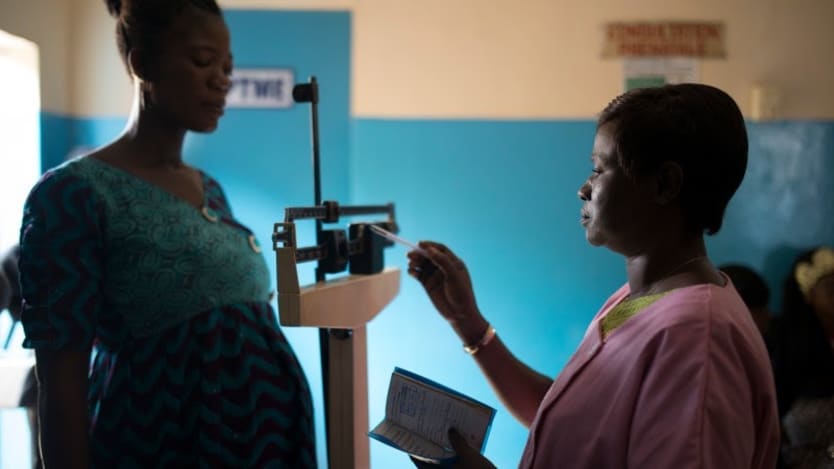
KAYA, Burkina Faso — Ramata Sawadogo was eight weeks pregnant when she was chased from her home by gunmen in May of last year. The 30-year-old spent the next few months running from village to village, in search of refuge and health care, in Burkina Faso’s center-north region.
At times, Sawadogo walked for more than a week with her six children to reach another town. Other times, she’d sleep in abandoned schools, all the while concerned that the stress and lack of food and medical care would harm her unborn baby.
“When I walked a lot, I got tired and was worried about the pregnancy,” Sawadogo said. Seated in a health clinic in a makeshift displacement site in Kaya town, where she now lives, she cradled her 7-month-old, grateful he is alive and healthy.
Violence linked to Islamic militants, local defense militias, and the army is escalating across Burkina Faso, killing almost 2,000 people this year, with deaths set to surpass the number of fatalities from 2019, according to the Armed Conflict Location & Event Data Project. Attacks have forced more than 1 million people from their homes and shuttered 12% of the country’s health facilities.
Women are bearing the brunt of the crisis, and attacks have impeded their ability to access sexual and reproductive care, including prenatal and postnatal services and contraception.
“Terrorist attacks constitute a new barrier to access of maternal healthcare services in Burkina Faso,” according to a recent study in The BMJ. The report, considered the first to document the effects of insecurity on health care in the country, found that in the month following an attack, assisted deliveries in medical facilities reduced by almost 4% and multiple attacks had graver consequences, impacting antenatal care and cesarean sections. The problem has been exacerbated by COVID-19, the report said.
In Burkina Faso, access to gender data is complicated by conflict
A surge in violence has made it harder for organizations to reach vulnerable populations — and to collect data. Nuanced information is more critical than ever to protect against worsening gender inequalities, humanitarians tell Devex.
On a visit to Kaya in September, Devex spoke with eight displaced women who said they have struggled to get timely reproductive and contraceptive help due to violence. Many were chased to unfamiliar towns where they did not know where or how to access services. In some cases, armed men destroyed pharmacies, making it hard to find medicine.
After Sawadogo was chased from her home, she sought prenatal care in the first small town she fled to. But there were too many patients and too few staff members at the clinic, so she was unable to see a doctor, she said. Before she could return, the town was attacked, forcing her to flee once again. It was not until arriving in Kaya, five months into her pregnancy, that Sawadogo had her first checkup for the baby.
The harder it becomes for women to reach health centers, the more risk they face — specifically for those who have been displaced, aid groups warn.
“These women need to be followed during their pregnancy until full term. If they are not followed, they can have a miscarriage,” said Yvette Yoda, a midwife working with Marie Stopes International, an aid group focused on providing contraceptives and safe abortions for women.
“With the displacement, they are in areas that they don’t know, they have no information,” she said.
Yoda has been with the organization for five years and used to work in rural areas, providing women with contraceptives and raising awareness about reproductive health. But now she says most of those areas are off-limits.
Finding ways to adapt
As violence in the country escalates, aid groups are scrambling to adapt. Last year, Marie Stopes halted most of its activities and readjusted its strategy, relocating staff members from remote and more insecure villages to larger towns, such as Barsalogho and Kongoussi in the Center-North. It also established clinics closer to the displaced population.
In Kaya — where the government estimates nearly 500,000 displaced people have sought refuge, according to Boukare Ouedraogo, the town’s mayor — Marie Stopes set up four clinics adjacent to makeshift displacement sites. The group also has mobile teams that visit a different town each week, depending on the needs.
“These women need to be followed during their pregnancy until full term. If they are not followed, they can have a miscarriage.”
— Yvette Yoda, midwife, Marie Stopes InternationalThe group’s biggest shift, however, was to expand its services, said Sylvain Ricard, Burkina Faso country director for Marie Stopes. Prior to the violence, the organization almost exclusively offered family planning services, such as those for contraceptives, but today it provides cervical cancer screenings, testing, and treatment for diseases spread through sex, including HIV/AIDS, as well as gender-based violence counseling.
“When you see people coming to Kaya with a lot of needs — food, shelter, water and sanitization, health — it’s difficult only to provide family planning,” Ricard said. Even though the organization is not able to access remote villages as easily, more people have been helped since it moved services closer to those displaced, he said. As of August, more than 100,000 people accessed Marie Stopes services this year, compared with 96,000 people at the same time last year, he said.
Other aid groups say the violence has made it harder to reach women, particularly those who never used the services before and might not know they exist.
Pathfinder, an international aid group providing women with access to sexual and reproductive health services, has largely been cut off from certain areas, especially in the hard-hit eastern region. Motorcycles purchased when the country was calmer cannot be used anymore because they are associated with motorcycle-riding attackers who target villages, said Lydia Saloucou, country director for Pathfinder in Burkina Faso.
“Our plan was to talk with more women, and we’re not able to do this,” she said.
Her team has tried to adapt by personalizing its approach, giving phone numbers of health workers to women in case they need help and relying more on the community health system to communicate information about reproductive services, she said.
Pathfinder is working with the Ministry of Health to find longer-term solutions to make it easier for women to get help closer to home. “This insecurity will not end early, and we need to adapt,” Saloucou said.
Compounding crises
Even in safer, easier-to-reach parts of the country, health workers are struggling to cope because the influx of displaced people is overwhelming clinics.
How aid groups navigate the rules of war in Burkina Faso
Almost 1,000 civilians were killed in 2019 by local militias and fighters linked to Islamic militants in the country. Some aid groups say that officially defining the situation as an armed conflict would make it easier to operate.
Insecurity has shuttered five health centers around Kaya, forcing the area’s main health center to provide care for eight times the usual number of patients, the International Committee of the Red Cross told Devex during a visit to the town in September. ICRC is helping the health facility by providing beds and training for health workers, yet nurses at the hospital’s maternity ward told Devex they have to discharge women 24 hours after giving birth instead of the required 48 hours, because there is nowhere for them to rest.
“There isn’t enough space for everyone,” said Issa Sawadogo, the nurse in charge of the center. At least 80% of the women she sees are displaced, she said.
Coronavirus restrictions imposed by the country in March, such as closing public transport and restricting movement between cities, have further reduced women’s access to care.
The amount of people getting tested for HIV and other sexually transmitted diseases and using family planning services has decreased by approximately 15% between the last half of 2019 and the first six months of this year, said Boureihiman Ouedraogo, director for the Burkinabe Association for Family Well-Being, a local aid group.
For women already impacted by violence, the virus is just another challenge to overcome.
Last year, 26-year-old Fatimata Sawadogo fled to Kaya when her village was attacked. It took time for her to find a health clinic that could remove the contraceptive implant from her arm, which was not working, she said. But by the time she figured out where to go, she was told not to leave her house due to coronavirus restrictions.
Not wanting to get pregnant, while already struggling to feed and shelter her two children at the displacement site, she refused to have sex with her husband until she could get a new implant.
“I’d prefer not to be pregnant now,” she said. “We already have enough concerns.”








